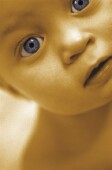
FRIDAY, Aug. 16 (HealthDay News) — Children with certain types of major birth defects not caused by chromosome abnormalities are at increased risk for childhood cancer, according to a new study.
Researchers analyzed data from Arizona, Iowa and Utah and found that children born with eye defects, cleft palate, some heart and kidney defects, and a condition in which the head is smaller than normal (microcephaly) were two times more likely to develop cancer before age 15 than children without these birth defects.
The increased risk was for cancers such as neuroblastoma, retinoblastoma and hepatoblastoma, all which typically develop in early childhood, according to the study, which was published recently in the journal PLoS One.
“There is a large body of evidence for increased cancer risk in children with Down syndrome, a genetic birth defect caused by the presence of an extra copy of chromosome 21,” study first author Dr. Lorenzo Botto, a professor of pediatrics at the University of Utah School of Medicine, said in a university news release.
“However, studies to date have provided inconsistent findings on cancer risk in children with structural birth defects that are not caused by chromosome abnormalities,” Botto added.
Although the study found an association between certain birth defects and higher odds of having some types of childhood cancer, it did not establish a cause-and-effect relationship.
“While there is an increased risk for cancer in young people with certain types of birth defects compared to children without birth defects, the overall cancer risk for a child with a birth defect is still relatively low,” Botto said. “So it is important for health care providers to be careful not to produce unnecessary concern among parents and families.”
“In addition, we found that the incidence of cancer was highest in the first three to five years of life, so clinical surveillance can be focused by age, as well as by birth defect,” he said.
The researchers also found that children with Down syndrome had a 14-fold increased risk of cancer, mainly leukemia. But they also found that children with many common birth defects — including cleft lip, hydrocephalus and hypospadias — did not have an increased cancer risk.
“It’s reassuring that many of the common major birth defects are not associated with any increase in cancer risk,” Botto said. “Our study helps to identify who is and who is not at increased risk for cancer, and this information can be used to focus future research on potential genetic or environmental factors that contribute to cancer risk.”
Each year in the United States, about 3 percent of babies are born with major birth defects.
More information
The Nemours Foundation has more about childhood cancer.
Copyright © 2026 HealthDay. All rights reserved.

